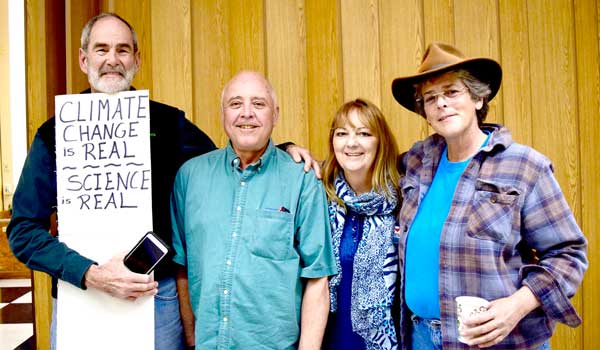Members speak out to protect climate, clean energy jobs
In the final week of November, KFTC members Russell Oliver, Stanley Sturgill, Henry Jackson, Teri Blanton, Roger Ohlman, Mary Dan Easley and Mary Love converged in Charleston, West Virginia – alongside hundreds of other concerned people – to testify to the U.S. Environmental Protection Agency (EPA) against the agency’s proposed repeal of the Clean Power Plan.
 “Now that we have cleaner, safer and cheaper ways to generate energy, the only question should be: how can we create more of those new jobs right here and right now in Appalachia? I know this because not only have I lived it, I’m still trying my best to keep living it,” said Stanley Sturgill of Harlan County, a retired coal miner and KFTC member.
“Now that we have cleaner, safer and cheaper ways to generate energy, the only question should be: how can we create more of those new jobs right here and right now in Appalachia? I know this because not only have I lived it, I’m still trying my best to keep living it,” said Stanley Sturgill of Harlan County, a retired coal miner and KFTC member.
Sturgill and others urged the EPA not to eliminate the Clean Power Plan rule. Issued in 2014, the plan is an Obama administration regulation that calls on states to develop plans for modestly reducing their carbon pollution. Most would do that through energy efficiency programs, development of solar and wind power, and reducing the amount of coal burned. States have lots of flexibility on how they choose to meet the standard.
Kentucky’s utilities would be required to reduce their carbon dioxide pollution by 31 percent by 2030 from the baseline of 2012 – something that will mostly be achieved anyway through coal plant retirements that have already happened or have been recently announced.
But, to meet or exceed the standard, the state also needs to adopt some new policies and strategies to reduce energy consumption and get more from renewable energy.
Instead, the EPA is proposing to do away with the rule, which has never actually been implemented due to court challenges. What’s more, the EPA’s proposed repeal of the Clean Power Plan has not followed the in-depth public engagement process that went into creating the plan.
KFTC member Mary Love pointed this out in her testimony to the EPA.
“This hearing today is not the conversation Americans want or deserve. We should be talking about how to improve the Clean Power Plan, not scrap it. We should be talking about how to better protect the health of low-income people and people of color who are on the front lines in places where fossil fuels are extracted, processed, transported and burned.”
Because the EPA’s hearing process was far from accessible or inclusive, KFTC members also attended the Hearing for Healthy Communities that the Sierra Club put on across the street from the capitol building. At this people’s hearing, Mary Dan Easley read a poem titled “Declaration of Interdependence” by David Suzuki.
Also at the Hearing for Healthy Communities, Teri Blanton, a KFTC member who grew up in Harlan County, read the testimony that she would give to the EPA the next day.
“Our people have been producing energy for this nation for over 100 years. We’re proud of our heritage. But there is no reason we should stay stuck in time as the world changes.
“Why shouldn’t eastern Kentucky be in the forefront of a clean energy revolution?” she asked. “Why shouldn’t we seize this moment to create jobs in wind, solar and hydropower? Appalachian people are resourceful, skilled and hardworking. We can put our communities back to work – today – by making our homes energy efficient and installing small-scale renewable energy systems.
“That’s true energy independence. This EPA climate plan can and should do much more to help us make this transition to a cleaner energy economy.”
Many of the KFTC members in Charleston also referenced the Empower Kentucky Plan (www.empowerkentucky.org) – a people’s energy plan showing that Kentucky can make a just transition to a clean energy economy. Last year, when it became clear that Kentucky officials had no intention of complying with the rule, KFTC took on the task of creating an energy plan for Kentucky, based on input from thousands of Kentuckians.
In the words of Love, “The Empower Kentucky Plan demonstrates that a just transition to a clean energy economy is possible. It shows that the very steps we need to address climate change are also better for jobs and ratepayers – and much better for health – than sticking our heads in the sand and doing nothing. And if we can do that in Kentucky, surely we can do it everywhere.”
Member Henry Jackson testified alongside Love. “What America really needs is a national climate policy coordinating clean energy development and resilience efforts of all eight climate zones of the U.S.,” he argued in his closing statement. “Anything less is irresponsible. The stakes couldn’t be higher.”
Recent News
Kentucky’s past legislative session showed alarming trend toward government secrecy
Churchill Downs takes more than it gives. That's why the Kentucky Derby is a no-go for me
‘We must never forget.’ Kentucky town installs markers for lynching victims.
Featured Posts
TJC Rolling Out The Vote Tour – a KFTC Reflection Essay
KFTC Voter Empowerment Contractor Reflection Essay
Voting is Power
Archives
- Home
- |
- Sitemap
- |
- Get Involved
- |
- Privacy Policy
- |
- Press
- |
- About
- |
- Bill Tracker
- |
- Contact
- |
- Links
- |
- RSS

